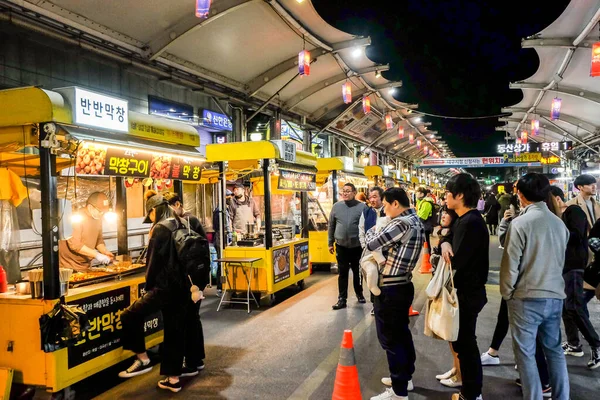
The Catholic Peace Weekly's Column by the paper's news director gives the readers some thoughts on Gentrification.
During his elementary school days in the 1970s, the 5-day market in his hometown was truly a festival with plenty to see, eat, and enjoy. The solicitation of the ‘wandering medicine hawkers’ was a cultural public performance held every five days. Musical instruments and dancers appeared, and various magic and demonstrations of power were performed. Monkeys and snakes appeared with strange feats performed. “Take a look at this! It doesn't come every day.” It was a scene where a crude homemade drug was turned into a panacea and sold, but regardless of the efficacy of the drug, onlookers continued to visit. At that time, the marketplace was the center of economic activities where sharing and friendship as well as reciprocity and gratuitousness were experienced in abundance.
His parents, who operated a ‘Pharmacy’ at the entrance to the market, allowed the vendors to set up stalls around the store when the market was open. They ate together and took care of their children in the house. His father repeated often: “When there are many merchants, people gather, and then there are many customers who buy medicine. If you're cold-hearted you'll kill each other. We have to live together.”
In the days when people had nothing and were hungry, the 5-day market was overflowing with food and hospitality. He saw a lot of food never seen before, and many were irresistible temptations. Even if you didn't have enough money, it was a marketplace where a bowl of rice soup was generously given and a few more were added to ask you to come next time.
A restaurant entrepreneur has renovated his hometown, Traditional Market, as part of a local coexistence project with the county office, and became a hot topic. The purpose was to develop the market and stimulate the local economy. When the permanent market was modernized to provide a variety of foods and attractions, beyond expectations hundreds of thousands of people gathered.
However, when visitors were turned away due to prolonged waiting times, parking problems, and lack of sanitary facilities such as toilets, it closed for a month and reopened in early April. In the meantime, various civil complaints have been resolved and food has become more diverse, but the most difficult task to solve was the phenomenon of ‘gentrification.’
‘Gentrification’— finds its etymological roots in the term gentry, or more specifically, landed gentry. It refers to a negative phenomenon in which low-income natives who originally resided are pushed out due to the influx of outsiders and money as the old city center is revitalized. The budget for the traditional market was the same. Some landlords notified existing merchants to vacate, and nearby accommodations and shops raised prices more than double, resulting in many victims.
Fortunately, with the efforts of the entrepreneur during the holiday period, most of these problems have been resolved. Sustainable jobs are provided to job seekers such as young people living in the region, and ‘local food’ is realized where agricultural products produced in the region are supplied as food ingredients.
Currently, our society is experiencing a crisis of serious social imbalance. Due to the low birth rate and the concentration of the population in the metropolitan area, there are concerns about “national and local existence”. Local autonomy was implemented in 1994 to revive local communities that were disappearing due to industrialization, but all local revitalization policies were of little help. One-time, subsidy policies are pointed out as a problem when they do not consider regional characteristics.
We have movements that are working to alleviate these problems that arise and one of them is: The economy of Communion (EoC). This is calling us to live, work, and do business in an integrated way, in concert with all of the other people in our lives. It is a project of the Focolare Movement a Catholic lay spiritual effort that seeks to unite people through economic activity and enterprise.
Revitalizing the traditional market and protecting the small commercial districts has its limits with the individual competence and sincerity of successful businessmen. The subject of commercial rights is the merchant, not politicians, government offices, or franchise companies. The sharing economy of distribution and growth can be realized only when selfishness is discarded and sharing and coexistence are pursued. Conflicts over gentrification in the budget market are educating us on how and what to do to resolve the regional imbalance.
No comments:
Post a Comment